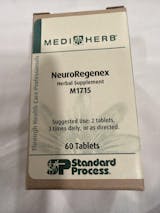Seasonal Allergies Explained
Take the mystery out of how your body deals with pollen, mold, pet dander and yeasts.


For so many people, seasonal allergies are a complete mystery. Flowers haven't even blossomed yet and they experience sneezing, headaches with itchy skin and eyes and even digestive issues can be caused by seasonal allergies.
Some people consider these seasonal allergies to be a minor inconvenience. But, allergies can get worse as body systems age — especially “if you wait for it to just go away”. You'll never be able to look at the flowers and go for a hike without enduring symptoms. Eventually, you'll experience symptoms inside your house.
Imagine yourself enjoying life, enjoying the outdoors and your friends and family without these annoying obstacles.
To unravel the mystery of environmental allergies from things like pollen and mold, let's take an in-depth look at what happens inside your body when you begin to feel your nose run and eyes itch.
The first thing to understand is your histamine response (your runny nose and itchy eyes) are completely normal. It’s your body’s way of protecting itself from invaders. Over the counter aids may mask the symptoms, but are not able to rebuild your health in three main areas: mucous membrane health, immune cell strength and liver congestion.

Itchy throat, relentless coughing, non-stop snot
When pollen travels through your nose and mouth, it first comes in contact with your mucous membrane. Your mucous membrane is a snot covered layer that protects your body. Mucus is produced by specialized cells called goblet cells and is your first layer of protection of your Immune system.
If these protective cells are missing their necessary nutrients, they won't be able to create enough mucus or the mucus can become thick or infected. This will leave the fragile tissues beneath unprotected for invasion and open for inflammation.
Common Seasonal Symptoms
- Runny Nose
- Excessive Sneezing
- Itchy and Red Eyes
- Sore Throat
- Nasal Congestion
- Sinus Pressure
- Difficulty Breathing
- Digestive Issues
- Itchy Skin
- Headaches
- Fatigue
- Respiratory Mucus

First focus on your mucous membrane!
Inflammation of the mucous membrane, which lines your entire respiratory system, including your nasal cavities and respiratory tract can make breathing difficult especially if the mucus is very thick and sticky.
Mucous membranes also line the digestive system. This is a double-whammy to folks who experience both seasonal allergies and food allergies.
Herbs such as Eyebright, Echinacea, Golden Rod, Golden Seal and Cayenne are prized for their ability to support a healthy mucous membrane. Herbal respiratory tonics and Amphoterics such as Golden Seal may be stimulating OR soothing, depending on the body’s need.


Next line of defense, your immune (Mast) cells!
Your body's mucous membranes are designed to protect you from dangerous foreign invaders like bacteria and viruses. But, if they are unhealthy, then your immune system takes over starting with your Mast Cells.
In a healthy person, the immune system will produce antibodies from Mast Cells. These specialized proteins identify and attach to outside invaders in our bodies. Once identified, these antibodies will then go on the hunt for any other cells that contain the same bacteria and viruses.
If you have allergy symptoms, your body has an overactive immune system. Your immune system doesn't know how to tell the difference between harmless substances like pollen and dangerous ones like bacteria.

Make Your Mast Cells Stronger!
Nutritional deficiencies compounded by stress cause the immune system to react as if these substances are harmful invaders that need to be destroyed. Your immune system releases chemicals called histamines to quickly flush the pollen through the system from specialized white blood cells.
A lot of research is looking at how herbs can make Mast Cells stronger to keep them from prematurely releasing histamine (also called bursting).
Herbs such as Feverfew and Chinese Skullcap and Turmeric from Mediherb are excellent tools to support healthy Mast Cell function.

Look to the liver if you suffer from itchy skin and eyes
Once the mast cells release histamine, the pollen travels to the liver where it is properly disposed of. The liver is an amazing organ that filters out the environmental toxins. A healthy liver does this with ease.
If the liver is not filtering properly, then histamine will get eliminated through the skin. This can cause itching and other symptoms of allergies (or more severe reactions in those who are sensitive.)
Your liver needs nutrients from root and cruciferous vegetables to function correctly.
Spanish black radish, beets, Swiss chard, sweet potatoes and bovine liver fat extracts contain specific phytochemicals that help produce bile and support a healthy detox pathway.

Strengthen your natural immune system
Your immune system is also largely responsible for inflammation resolution. People with long-standing, adult-onset allergies also have chronic inflammatory issues. We see people who use our herbal formulas also resolve their inflammation.
The body’s immune system is designed to fight off foreign invaders and heal wounds. When it fails to do so, it can lead to chronic inflammation and autoimmune conditions.
Painful inflammation is the body’s first response when it encounters a pathogen or injury, but if this response continues for too long or is repeated too often, it can cause problems.
By supporting your liver’s ability to remove histamine, increase the strength of the mast cell response, and restore mucous membranes, you can beneficially impact more than just your ability to handle pollen, pet dander, mold, other environmental irritants and resolve long-standing inflammation.
Seasonal Stressor Support Plans
Healthy Skin and Eyes Support Plan
Healthy Histamine Response Support Plan
Breathe Easy Supplement Plan
Helpful links and references
1. Shin HS, See HJ, Jung SY, Choi DW, Kwon DA, Bae MJ, Sung KS, Shon DH. Turmeric (Curcuma longa) attenuates food allergy symptoms by regulating type 1/type 2 helper T cells (Th1/Th2) balance in a mouse model of food allergy. J Ethnopharmacol. 2015 Dec 4;175:21-9. doi: 10.1016/j.jep.2015.08.038. Epub 2015 Sep 2. PMID: 26342520.
2. Baek OS, Kang OH, Choi YA, Choi SC, Kim TH, Nah YH, Kwon DY, Kim YK, Kim YH, Bae KH, Lim JP, Lee YM. Curcumin inhibits protease-activated receptor-2 and -4-mediated mast cell activation. Clin Chim Acta. 2003 Dec;338(1-2):135-41. doi: 10.1016/j.cccn.2003.08.015. PMID: 14637278.
3. Allison Williams, ND. Mast Cell Activation Syndrome & Histamine Intolerance: An Herbal Approach. July 10, 2019. https://www.botanicalmedicine.org/herbal-approach-to-mcas-and-histamine-intolerance/
4. Hayes NA, Foreman JC. The activity of compounds extracted from feverfew on histamine release from rat mast cells. J Pharm Pharmacol. 1987 Jun;39(6):466-70. doi: 10.1111/j.2042-7158.1987.tb03421.x. PMID: 2441022.
5. Kinney SR, Carlson L, Ser-Dolansky J, Thompson C, Shah S, Gambrah A, Xing W, Schneider SS, Mathias CB. Curcumin Ingestion Inhibits Mastocytosis and Suppresses Intestinal Anaphylaxis in a Murine Model of Food Allergy. PLoS One. 2015 Jul 6;10(7):e0132467. doi: 10.1371/journal.pone.0132467. PMID: 26147007; PMCID: PMC4493063.
6. Pungle P, Banavalikar M, Suthar A, Biyani M, Mengi S. Immunomodulatory activity of boswellic acids of Boswellia serrata Roxb. Indian J Exp Biol. 2003 Dec;41(12):1460-2. PMID: 15320503.
7. Scott O, Galicia-Connolly E, Adams D, Surette S, Vohra S, Yager JY. The safety of cruciferous plants in humans: a systematic review. J Biomed Biotechnol. 2012;2012:503241. doi: 10.1155/2012/503241. Epub 2012 Feb 22. PMID: 22500092; PMCID: PMC3303573.
8. Maeda K, Caldez MJ, Akira S. Innate immunity in allergy. Allergy. 2019 Sep;74(9):1660-1674. doi: 10.1111/all.13788. Epub 2019 Apr 14. PMID: 30891811; PMCID: PMC6790574.
9. Martin SF. The role of the innate immune system in allergic contact dermatitis. Allergol Select. 2017 Aug 4;1(1):39-43. doi: 10.5414/ALX01274E. PMID: 30402600; PMCID: PMC6039998.




